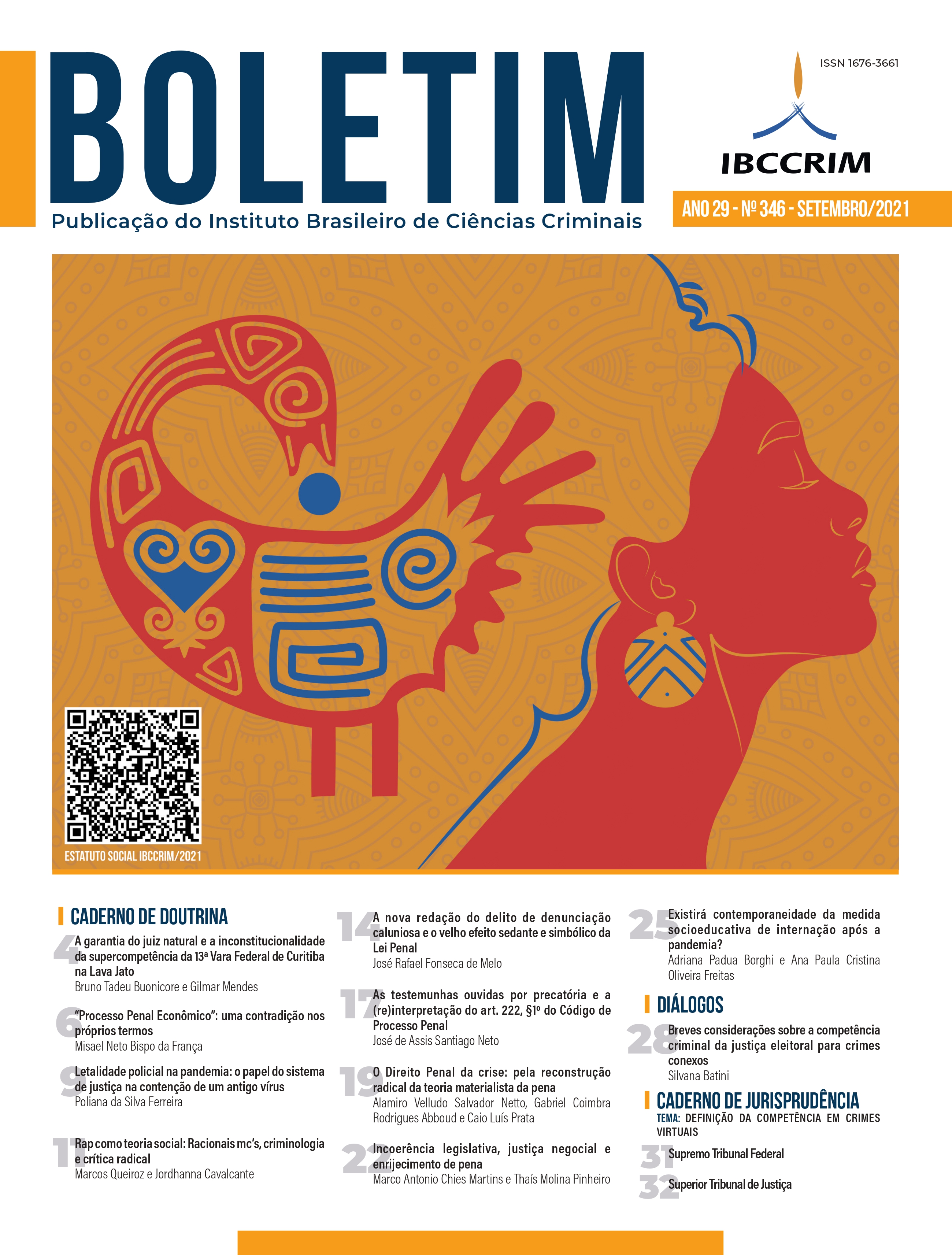The new wording of the slanderous denunciation crime and the old sedative and symbolic effect of penal law
Views: 137Keywords:
Slanderous denunciation, Legality, Peremptoriness, Rewarded delationAbstract
With the advent of Law 14.110/2020, which amended art. 339 of the Penal Code, the phenomenon of expanding the hypotheses of procedures triggered by false insinuation, as well as of the imputations of illegal acts to be investigated occurred. Under the argument of reducing the subjectivity/amplitude of generic expressions of the legal type and bounding the criminalizing perimeter in compliance with the peremptoriness, other limiting principles such as fragmentation and minimal intervention were sacrificed. In the face of the choleric atmosphere in which rewarded delation is engaged, where lying is an instrument of political pressure that corrupts and contaminates the public environment with the spread of false news, this article analyzes this conflict between increasing the normative scope in favor of accuracy and violating principles in favor of the punitive appeal.
Downloads
Publication Facts
Reviewer profiles N/A
Author statements
- Academic society
- Instituto Brasileiro de Ciências Criminais
- Publisher
- IBCCRIM
References
BATISTA, Nilo; BÉZE, Patrícia Mothé Glioche. Denunciação Caluniosa. Rio de Janeiro: Revan, 2020.
BECCARIA, Cesare. Dos delitos e das penas. São Paulo: RT, 1999.
BRANDÃO, Cláudio. Tipicidade Penal. Coimbra (Portugal): Almedina, 2012.
BRASIL. Presidência da República. Casa Civil. Subchefia para Assuntos Jurídicos. Constituição da República Federativa do Brasil de 1988. Brasília (DF): Site do Planalto, 1988. Disponível em: http://www.planalto.gov.br/ccivil_03/Decreto-Lei/Del2848.htm. Acesso em: 13 jan. 2021.
BRASIL. Supremo Tribunal Federal. Pleno. RE 593.727, repercussão geral. Rel.: Min. Cezar Peluso; Relator do acórdão: Min. Gilmar Mendes, julgamento em 14/05/2015, publicado em 08/09/2015. Disponível em: http://www.stf.jus.br. Acesso em: 13 jan. 2021.
BRASIL. Supremo Tribunal Federal (2. Turma). RHC 56.856. Rel.: Min. Cordeiro Guerra, julgamento em 20/03/1979. Disponível em: http://www.stf.jus.br. Acesso em: 13 jan. 2021.
CARNELUTTI, Francesco. Acerca de la calumnia. In: CARNELUTTI, Francesco. Cuestiones sobre el Proceso Penal. Trad. S. S. Melendo. Buenos Aires: E. América, 1961.
CARRARA, Francesco. Programma del Corso di Diritto Criminale. Florença: Ed. Fr. Cammelli, 1897.
FRAGOSO, Heleno Cláudio. Lições de Direito Penal. 2 vol. Rio de Janeiro: Forense, 1988.
GIORDANI, Mário Curtis. História da Grécia. Petrópolis: Ed. Vozes, 1984.
MONTESQUIEU, Charles de Secondant, Baron de la. O espírito das leis. São Paulo: Martins Fontes, 1996.
TAVARES, Juarez. Fundamentos de Teoria do Delito. Florianópolis: Tirant lo Blanch, 2018.
Downloads
Published
How to Cite
Issue
Section
License
Copyright of published articles belongs to the author, but with journal rights over the first publication and respecting the one-year exclusivity period. Authors may only use the same results in other publications by clearly indicating this journal as the medium of the original publication. If there is no such indication, it will be considered a situation of self-plagiarism.
Therefore, the reproduction, total or partial, of the articles published here is subject to the express mention of the origin of its publication in this journal, citing the volume and number of this publication. For legal purposes, the source of the original publication must be consigned, in addition to the DOI link for cross-reference (if any).


 Português (Brasil)
Português (Brasil)
 English
English
 Español (España)
Español (España)




